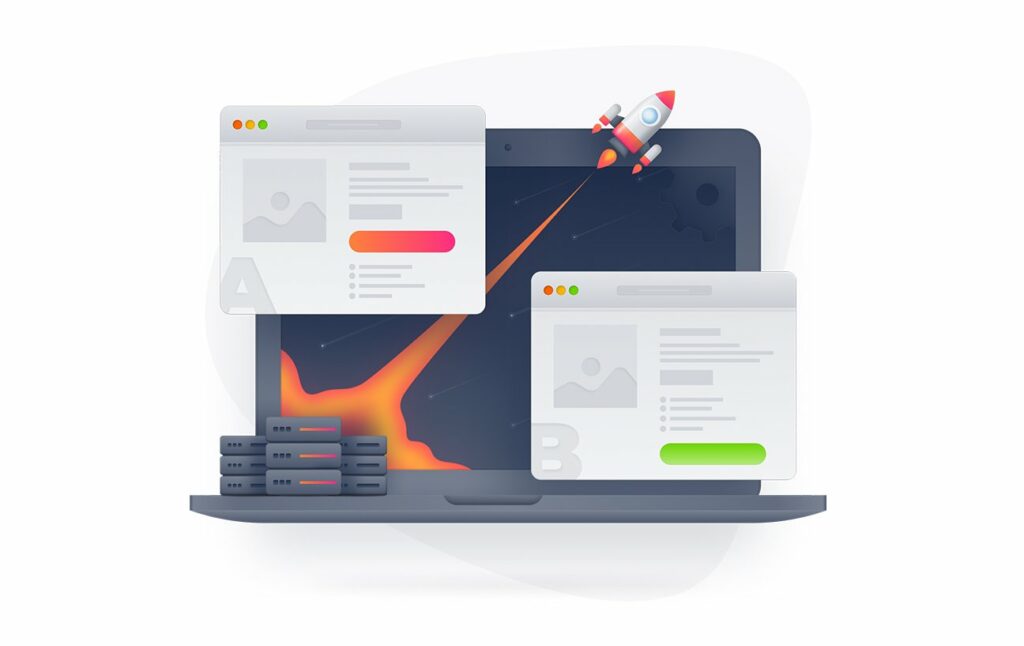As the digital age progresses, businesses must keep up with the latest web development trends to stay relevant. This means having a website that functions well and looks good on all devices, from desktop computers to mobile phones.
In addition, businesses need to ensure their websites are optimized for search engines so customers can easily find them online. As a web development agency in Manchester, we’ll help you better understand why this matters and how to take advantage of it.
What is website development?
Web development is designing and building a website for the Internet (World wide web) from scratch or improving an existing website. This includes everything from the layout and structure of the site to the code that makes it work. Development is a complex process involving many different skills and disciplines, such as web design, coding, user experience design, etc.

It covers everything from building simple web pages to a sophisticated social network. While web development often describes the web markup and coding, it covers all relevant development tasks, including client-side programming, server-side scripting, server/networking security configuration, and e-commerce development.
Web development process- What does it involve?
No matter what type of website you’re building, the process typically involves the following steps:
- Planning and wire-framing
- Design
- Coding and development
- Testing and launch
- Maintenance and updates
Planning and wire-framing
First, a business will need to identify its goals and objectives for its website. Once these have been established, an experienced web developer will be able to create a plan of action to achieve these goals. They will need to plan and wireframe your website to determine what features the website should include, how it will look, and how users will interact with it. This involves creating user flows and sitemaps and creating visual mockups using tools like Balsamiq or Photoshop.

Design
Once you have your wireframes in place, you can move on to the design phase. A web developer will create the website’s structure and design. This will include planning the navigation, layout, and overall look and feel of the site- your website’s visual style, colors, and format.

Coding and development
Once the design is complete, a developer will begin to write the code that powers your website. This involves using one or more programming languages (HTML5, CSS3, and JavaScript) and frameworks to create the back-end functionality and front-end design.
Testing and launching
A website needs to be tested for bugs and issues before it can be launched. A web developer will run automated tests on the site’s code to ensure that everything is working. This may involve testing different browsers and devices to provide a fully functional website. Once you’re confident that it’s ready, you can deploy the website to a server so that it is accessible to users! You need an internet connection for this step.

There are many different options for hosting, including dedicated servers, VPS hosting, and cloud hosting.
Maintenance and updates
Once your website is up and running, you will need to regularly maintain and update it over time to keep it running smoothly and ensure that it continues to meet the needs of your users. It includes
- Ensuring that the software and plugins are up-to-date,
- Making sure that the content is fresh and relevant,
- Adding new features or making changes to the website’s design from time to time,
- Fixing bugs, or
- Improving performance and security.
Standard tools for maintaining web applications include version control systems like Git, issue trackers like Jira, and monitoring tools like New Relic.
Web development is a complex process, but it can be broken down into these simple steps. By following these steps, you can ensure that your website will be successful.
Skills and Tools for Web development
Skills
There are many different skills required for effective web development. Developers need to have a strong understanding of
· Web design/ Graphic design,
· User experience (UX) design,
· Coding and computer programming
· Different types of software and technologies
· Content management systems,
· Testing and quality assurance,
· Server/networking security configuration,
· E-commerce development, and
· Search engine optimization.
· Developers need to be able to problem-solve and troubleshoot issues that may arise.
In addition to technical skills, web developers must also have strong communication and project management skills to work effectively with clients and other teams.
Tools
Types of tools and technologies used for web development include;
· Content management systems (CMS), such as WordPress or Drupal,
· Coding and a scripting language such as HTML, CSS, JavaScript, PHP, Python, Ruby, or Java to build the back-end functionality of the site.,
· Development frameworks like Laravel or Ruby on Rails,
· Testing and debugging tools like Firebug or Chrome DevTools to automate tests to ensure that the website is working properly and free of bugs,
· Monitoring tools such as New Relic or Google Analytics Additionally, web developers may use Photoshop or Balsamiq to create visual mockups of their websites.
· Front-end frameworks like React.js, VueJS, or AngularJS create a modern and responsive user interface.
· Databases like MySQL, MongoDB, or Cassandra to store data
· Web servers like Apache or Nginx to host the website
· Version control systems like Git to manage code changes.
· Issue trackers like Jira to keep track of bugs and features.
· Monitoring tools like New Relic to track the performance of the website.
· Security tools like SSL/TLS certificates and firewalls to keep the site safe.
· eCommerce platforms like Shopify or Magento to sell products online.
· Web design tools like Photoshop or Sketch to create visual mockups.
Types of Web development
There are two main types of web development: front-end and back-end.
Front-end web development
Front-end web development refers to developing the client-side or front-end of a website, which users see and interact with within their web browser. It includes everything from the website’s layout and design to its content and features.

Back-end web development
On the other hand, back-end web development refers to the development of the server-side or back-end of a website. This code runs on the web server and powers the website’s functionality. It includes everything from database management to security and performance.
Web development projects
Web development projects can range from small, personal websites to large-scale enterprise applications. Some common web development projects include :
· Building a website for a small business or startup company,
· Developing an ecommerce site to sell products online,
· Creating a mobile app that connects to the user’s web service, or
· Building a custom web application for a client.
When starting a web development project, the first thing you need to do is determine what type of website you will build. There are three main types of websites:
· Static websites
· Dynamic websites
· E-commerce websites
Static websites
A static website has web pages stored on the server in their original form. They are not generated by a server-side application. Static websites are typically written in a programming language such as HTML and CSS. Static websites can be edited using a text editor or HTML editor.
Dynamic websites
A dynamic website uses server-side code to generate web pages on the fly. It typically involves connecting a database or other data source to a web application, dynamically developing the web pages based on user input and other factors. Dynamic websites can be written using many different programming languages and frameworks, such as PHP, Ruby on Rails, Python, ASP.NET, Node.js, etc.
E-commerce websites
An e-commerce website is a type of dynamic website explicitly designed for selling products and services online. It typically involves integrating shopping cart functionality, payment processing, inventory management, and other features needed to run an online store. Ecommerce websites can be built using many different technologies and frameworks, such as Magento, Shopify, WooCommerce, etc.

The different types of web developers
There are many different types of web developers;
Front-end developer
Front-end developers are responsible for the design and user experience of a website. They use HTML, CSS, and JavaScript to build visually appealing websites and easy to use.
Back-end developer
Back-end developers are responsible for the functionality of a website. They use server-side scripting languages, such as PHP, Ruby on Rails, and ASP.NET, to build fast and reliable websites.
Full-stack developers
Full-stack developers are responsible for both the front-end and back-end development of a website. A full-stack developer will use both front-end and back-end technologies to build functional, easy-to-use, and visually appealing websites.
As the web industry evolves, there will likely be even more specialization within web development over time. For example, there may be specializations for mobile app development, Augmented Reality (AR) development, and Virtual Reality (VR) development.
The future of web development
The future of web development looks very bright. With the increasing popularity of mobile devices and new technologies such as virtual reality, there will likely be many exciting developments in web development in the coming years.
One potential trend is an increased focus on user experience (UX).
More businesses recognize the importance of creating functional, easy-to-use, and visually appealing websites. This is driving the development of new tools and technologies that can help designers create more engaging websites.
Another trend is an increased focus on security.
As more businesses and organizations rely on websites to connect with their customers, there is a greater need for effective cybersecurity measures. Web developers will likely play a key role in developing and implementing these security measures.
Finally, there is a growing trend towards more specialized web development roles.
As the industry evolves, there will likely be an increased need for developers with specific skillsets. For example, we may see more developers specializing in mobile app development or AR/VR development.
No matter what the future holds, it is clear that web development will remain a vital and growing industry.
Web developers and aspiring web developers must stay up-to-date on the latest trends in web development. This involves constantly learning new programming languages, tools, and technology. Many developers also participate in online communities and attend conferences to stay up-to-date on the latest trends in web development.
Basic Web Development concepts that you need to know:
Markup languages:
HyperText Markup Language (HTML)- the standard markup language used to create web pages. HTML consists of elements used to structure content on a web page.
Cascading Style Sheets (CSS) is a style sheet language used for describing the presentation of a document written in a markup language. CSS controls the appearance and layout of web content, including fonts, colors, spacing, and more.
Programming languages:
Many different programming languages are used for web development, including PHP, Ruby on Rails, Java, and Python. These languages create dynamic website content, such as forms, contact information, and search results.
Content management systems:
A content management system (CMS) is a software application used to create and manage digital content. WordPress and Drupal are the most popular CMS platforms. These platforms provide an easy-to-use interface for creating and managing website content.
Why is good web development important for businesses?
There are many benefits of good web development for businesses in the digital age. Here are some of the most important ones:
Increased Customer Reach
A well-developed website will be accessible to a much wider audience than one that is not optimized for mobile devices. This means that businesses can reach a more significant number of potential customers, leading to higher sales and more revenue.
Improved Brand Image
A professional website that is well-designed and easy to navigate will help businesses to establish a strong brand image. This can instill confidence in potential customers and make them more likely to purchase products or services from the company.
Increased Sales
A well-developed website makes it easy for customers to find what they are looking for and make a purchase. This can lead to increased sales and revenue for businesses.
Improved Customer Loyalty
A good web development team will take the time to understand your business and your customers. This will allow them to create a website tailored to your specific needs and that provides a positive experience for users. This can lead to increased customer loyalty and repeat business.
Increased Customer Engagement
A well-developed website can help to engage customers and encourage them to stay on the site longer. This can lead to increased sales and more business opportunities to build relationships with their customers.
Improved Search Engine Rankings
A well-developed and optimized website for search engines will rank higher in search results, making it more likely to be seen by potential customers. This can lead to increased traffic and higher sales for businesses.
Increased Efficiency
A well-developed website can help businesses save time and money by streamlining processes and automating tasks. This can lead to increased efficiency and productivity, improving the bottom line.
Reduced Costs
With the right web development team, businesses can reduce costs by automating tasks, improving efficiency, and reducing spending on advertising. This means that good web development can save money in the long run.
Recommended: Benefits of hiring a web designer for your business.
Conclusion
Whether you are a small business owner or the marketing manager for a large corporation, web development is essential for any successful online presence. Whether you need to create a simple landing page, build a complex e-commerce website, or maintain an existing site, hiring qualified and experienced developers can help ensure that your project is done right and on time.
It is essential to work with a team of skilled web developers who understand the latest trends and best practices. With the right strategies, you can take your business to the next level and stay ahead of your competition.

